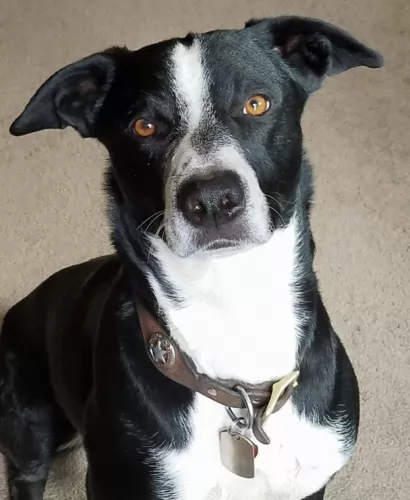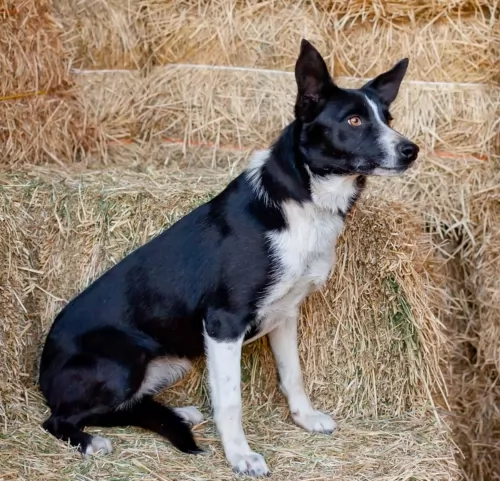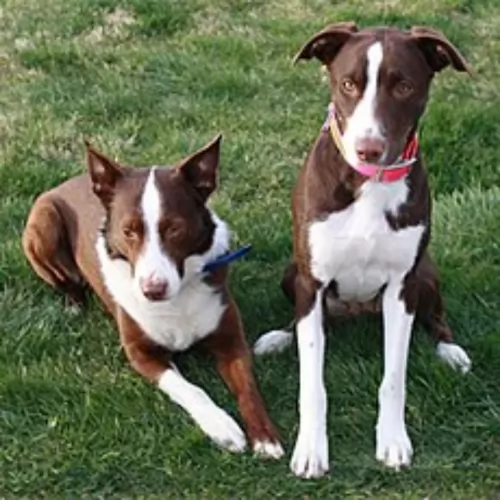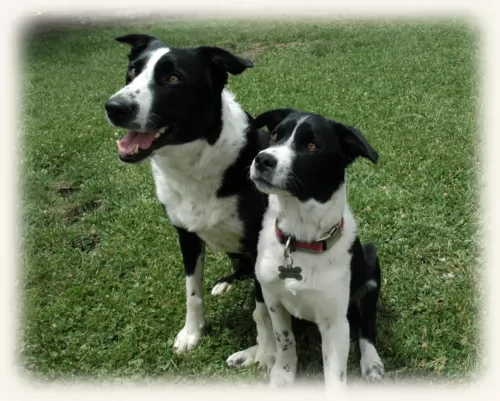 Petzlover
Petzlover McNab is originated from United States but Portuguese Podengo is originated from Portugal. McNab may grow 34 cm / 14 inches higher than Portuguese Podengo. McNab may weigh 24 kg / 53 pounds more than Portuguese Podengo. Both McNab and Portuguese Podengo has almost same life span. Both McNab and Portuguese Podengo has almost same litter size. Both McNab and Portuguese Podengo requires Low Maintenance.
McNab is originated from United States but Portuguese Podengo is originated from Portugal. McNab may grow 34 cm / 14 inches higher than Portuguese Podengo. McNab may weigh 24 kg / 53 pounds more than Portuguese Podengo. Both McNab and Portuguese Podengo has almost same life span. Both McNab and Portuguese Podengo has almost same litter size. Both McNab and Portuguese Podengo requires Low Maintenance.
 The attractive McNab dog is also known as the McNab Shepherd or McNab Collie. This very lively dog originated in the Mendocino region of Northern California, being specifically bred to withstand tough weather conditions and rough terrain.
The attractive McNab dog is also known as the McNab Shepherd or McNab Collie. This very lively dog originated in the Mendocino region of Northern California, being specifically bred to withstand tough weather conditions and rough terrain.
The dog is becoming popular outside of California now. A Scottish rancher with the surname McNab left Scotland and arrived in California in the 19th century. He crossed Scottish Border Collies with Shepherd dogs and the ranchers in California started using these dogs for herding livestock.
Today they are still being used as herding dogs in California and other countries. The dog isn’t recognized by the American Kennel Club. It was in 2014 that a group of McNab Shepherd breeders established the McNab Shepherd Registry so as to work towards the advancement of the McNab Shepherd.
 The Portuguese Podengo is an ancient hound dog from Portugal. It is available as a small dog, medium and large dog.
The Portuguese Podengo is an ancient hound dog from Portugal. It is available as a small dog, medium and large dog.
The coats can be short and smooth or longer and wiry. They were imported into the United States in the 1990's and they are also recognized by the Federation Cynologique Internationale in Europe. They are also recognized by the United Kennel Club. In America they are part of the Rare Breed Association.
 The McNab Dog is a medium-sized working dog. The appearance of this dog varies quite a bit. For instance you may come across a dog with erect ears or floppy ears or a long tail or one that is naturally bobbed.
The McNab Dog is a medium-sized working dog. The appearance of this dog varies quite a bit. For instance you may come across a dog with erect ears or floppy ears or a long tail or one that is naturally bobbed.
When it comes to size, you will find that between the males and females they stand at roughly 40 – 64cm and weigh anything from 14 – 30kg.
Most of these McNabs are black or red with white feet, white tipped tails and white markings around the face. The coat is weather resistant and fairly short and dense. You also get tri-colored McNabs. Eyes are usually a brown or copper color though you might find some with bluish eyes as well.
These are such intelligent dogs so with training and socialization you’ll find he is able to learn easily and quickly. He is a self assured dog, so he will respond well to an owner who is firm and fair, patient, kind and consistent.
He is best suited to life in the country as he needs lots of place to run around. If you don’t live on a farm, take the dog for long walks every day as he requires lots of exercise and mental stimulation. He is a loving family member too, getting along well with kids in the home as well as other pets. He is also a good guard- and watch dog, taking his job as protector of his human family very seriously.
 The Portuguese Podengo is available in three sizes. He stands roughly at between 20 to 30 cm and weighs between 4.1 to 5.9 kg. The dog is similar in looks to other hunting dogs native to the Mediterranean, such as the Pharoah Hound.
The Portuguese Podengo is available in three sizes. He stands roughly at between 20 to 30 cm and weighs between 4.1 to 5.9 kg. The dog is similar in looks to other hunting dogs native to the Mediterranean, such as the Pharoah Hound.
They are small to medium sized dogs. The eyes are brown, the ears are erect and the tail long and thick, held low and with a bit of a curve when at rest.
The body of the dog is lean and well muscled and the head wedge shaped. The coat is essentially short and smooth though you also get the longer, wiry coat. The coat is found in shades of fawn or yellow and with some white markings.
This Portuguese sighthound is energetic, comical sometimes, sweet and loving. Being alert, he also makes a good watchdog.
He is intelligent, he is easily trained and socialized and gets on well with children in the house if they have been disciplined to respect and be kind to animals.
He is somewhat aloof around strangers and this is actually what makes him a good watchdog.
It is said that the Portuguese Podengo isn't bred to be a companion dog, being bred exclusively as a working hunting dog. This explains why it doesn’t have such a ‘companionable’ temperament as some other dog breeds.
 The McNab makes a splendid pet and is known to be even-tempered, being friendly and tolerant with his entire human family.
The McNab makes a splendid pet and is known to be even-tempered, being friendly and tolerant with his entire human family.
He gets on well with children in the home as well as other pets. He has always been a hard working pet and doubles up as being an excellent guard dog too. Those who have had the McNab as a pet say that you couldn’t get a more excellent family canine friend.
 The Portuguese Podengo loves pleasing his human owners – loving to be in the company of his human family.
The Portuguese Podengo loves pleasing his human owners – loving to be in the company of his human family.
He is an independent dog who will benefit from training and socialization. He is wary around strangers, but this makes him a good watchdog.
He loves lots of exercise and will want mental and physical stimulation to be happy and content and as bright as he is.
Provide him with good care and he promises to make you a wonderful pet and companion.
 This dog doesn’t really have genetic health issues, but they can suffer with hip dysplasia, a problem that many dogs battle with, whether small or large, young or old.
This dog doesn’t really have genetic health issues, but they can suffer with hip dysplasia, a problem that many dogs battle with, whether small or large, young or old.
They can also suffer with epilepsy and an eye disease such as entropion where the lid of the eye is turned inwards. Check its ears and teeth regularly for infections and keep up to date with his vaccinations.
The McNab is a health dog breed so you aren't likely to face any of these common dog health issues.
 The Portuguese Podengo is a robust, healthy dog that can get to 14 years of age if he is looked after well and exercised.
The Portuguese Podengo is a robust, healthy dog that can get to 14 years of age if he is looked after well and exercised.
The dog doesn’t battle with genetic disorders. It is thought that the most common problems with this dog are the injuries he gets from being such an outdoor, hunting dog. He could well rip his nail or have porcupine quills in his muzzle.
Some common dog diseases to be aware of are cancer, bloat,skin diseases and eye problems.
 You can feed your McNab dog commercial dry kibble, but then you want to be sure its the best quality one. Buying inferior foods means that you’re getting a whole lot of ingredients in the food that are bad – sugar, salt, preservatives, fillers, colorants etc. Rather go for the best brands that will ensure that your dog is getting all the vitamins and minerals he needs.
You can feed your McNab dog commercial dry kibble, but then you want to be sure its the best quality one. Buying inferior foods means that you’re getting a whole lot of ingredients in the food that are bad – sugar, salt, preservatives, fillers, colorants etc. Rather go for the best brands that will ensure that your dog is getting all the vitamins and minerals he needs.
Homemade food is also important and foods such as boiled chicken, brown rice and pasta as well as cooked or raw vegetables chopped up and added to his dry kibble can make for a delicious, wholesome treat. It will be to his benefit if you can every now and then give him some raw meat as well. Make sure to see that he has a constant supply of fresh, cool water.
McNab Shepherds are very active dogs and they are going to require quite a bit of physical exercise as well as mental stimulation. They are dogs who have been used to herding livestock and he loves this busy life. It is why he wouldn’t be happy living in the city but is better suited to farm life or in a home with a large garden. Long walks and hikes will suit him as well as swimming and joining in every game there is.
The McNab is considered to be a low maintenance dog and grooming the short thick coat will be required twice a week. Always check around the eyes and ears as well as inside the mouth for problems and infections.
 The Podengo is always game and ready for a good time and likes nothing more than a good walk as well as the chance to get off his leash and have a bit of free time. He also loves ball games, being pulled along while he holds tightly on to a piece of rope and he loves darting back and forwards with a frisbee.
The Podengo is always game and ready for a good time and likes nothing more than a good walk as well as the chance to get off his leash and have a bit of free time. He also loves ball games, being pulled along while he holds tightly on to a piece of rope and he loves darting back and forwards with a frisbee.
Many things can change a dog’s longevity, and diet is one. A good nutritious diet with vitamins and minerals will give your dog less of a chance to get sick. If you go for the best quality commercially manufactured dog foods, you’ll find they are both convenient and well balanced.
To provide your dog with just a bit of variety in his diet, some home-made food added into the dry kibble from time to time will delight your pet.
No need to make preparing the food a huge issue either. Boil brown rice and chicken in a pot and add in sweet potatoes, carrots and spinach. Chop all this up and as a treat, add smaller portions of it into the dry kibble. This is a real treat for your dog. You’ll see his thanks in his bright eyes and wagging tail.
Try to include a bit of raw meat occasionally and never let your dog be without a constant source of fresh, cool water.
Make sure his puppy vaccines are up to date.
Have your dog spayed or neutered if you don’t want your dog being a parent.
Provide your dog with a warm, dry, comfy pace to sleep.
Trim his nails and check inside his ears for redness and infection.
Check for fleas and ticks when you brush him.
Get him to the vet when you can see he s sick.